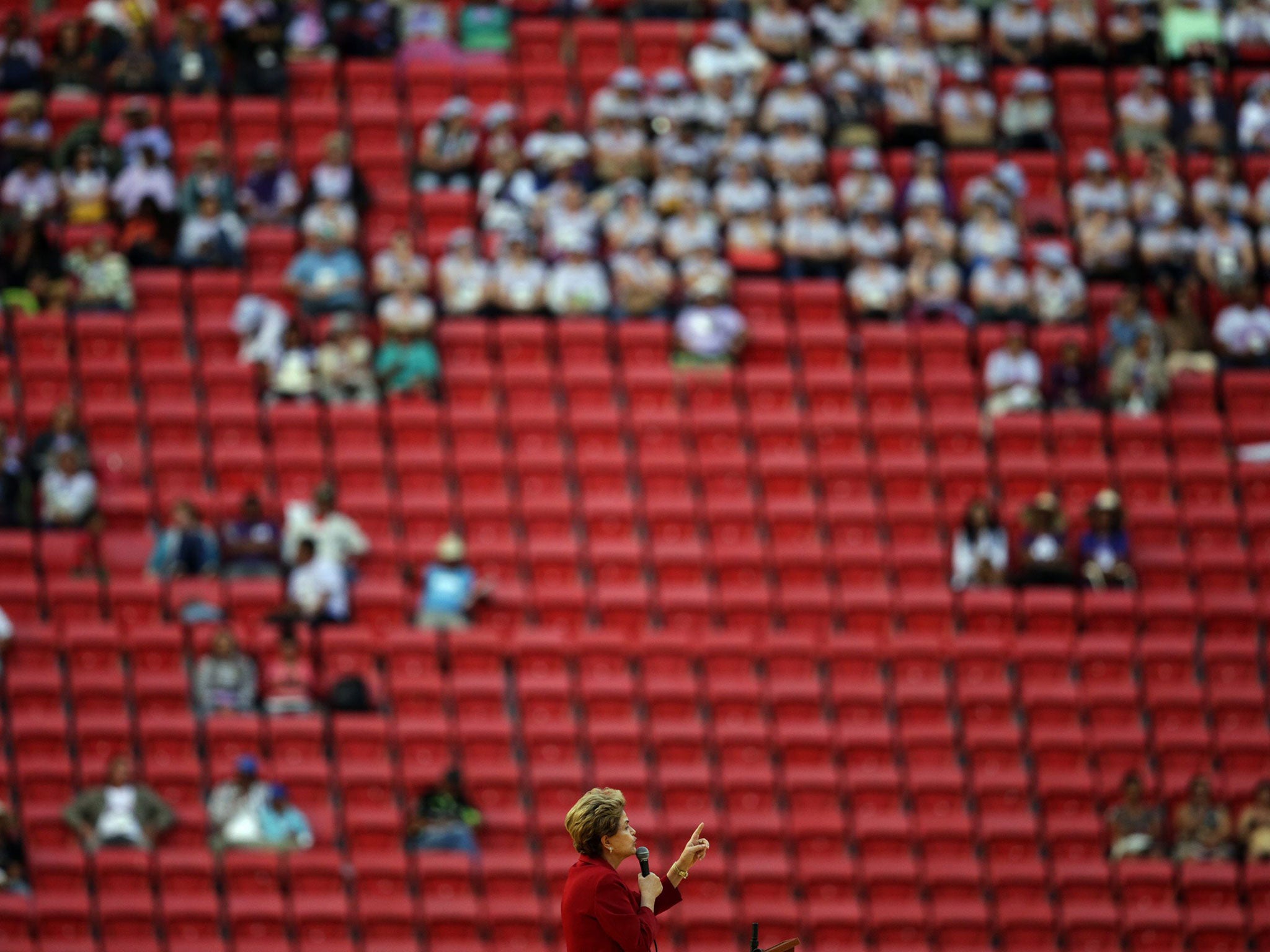Brazil President Dilma Rousseff facing make or break fortnight as scandals, political schisms and protests threaten her position
Two-thirds of Brazilians polled believe Congress should begin the process to remove the former leftist guerrilla - but the problem is a lack of an alternative

Your support helps us to tell the story
From reproductive rights to climate change to Big Tech, The Independent is on the ground when the story is developing. Whether it's investigating the financials of Elon Musk's pro-Trump PAC or producing our latest documentary, 'The A Word', which shines a light on the American women fighting for reproductive rights, we know how important it is to parse out the facts from the messaging.
At such a critical moment in US history, we need reporters on the ground. Your donation allows us to keep sending journalists to speak to both sides of the story.
The Independent is trusted by Americans across the entire political spectrum. And unlike many other quality news outlets, we choose not to lock Americans out of our reporting and analysis with paywalls. We believe quality journalism should be available to everyone, paid for by those who can afford it.
Your support makes all the difference.The walls are closing in around the Brazilian President, Dilma Rousseff. With the lowest approval ratings of any president in recent history, she now faces the biggest protests yet against her Workers’ Party government. But she refuses to quit.
The scandal at the state-controlled oil and gas company Petrobras, a stalling economy and political schisms have caught up with the former leftist guerrilla, re-elected last October.
Now, Ms Rousseff heads for a make or break fortnight.
She has an extended deadline of 15 days to defend public accounts to the Audit Courts amid questions of financial irregularities over government spending last year.
Federal police continue to arrest public officials as suspects in the Lava Jato (“Car Wash”) investigation into contract fixing, graft and bribery within Petrobras, of which Ms Rousseff was chairwoman.
Meanwhile, one of Brazil’s biggest protest movements is gearing up for nationwide anti-government rallies in 250 cities on Sunday.
Vem Pra Rua (“Come to the Streets”), along with the Free Brazil Movement and Revoltados Online, are urging tens of thousands to march against Ms Rousseff.
Rogerio Chequer, one of Vem Pra Rua’s leaders, said the government had lost its connection with the electorate, which no longer had faith in the independence of political institutions. “Fortunately, the population is waking up and shouting against this,” Mr Chequer said in a radio interview.
Last week, there were a series of “panelaço” protests in which Brazilians beat pots and pans from their windows during political broadcasts.
Research published at the end of July by the public opinion institute, Ibope, found a crisis of confidence after last year’s closely fought presidential election.
The Social Confidence Index measured trust on a 100-point scale, with faith in the President falling from 66 in 2009 to 22 this year. And a poll by Datafolha found positive assessment of Ms Rousseff had fallen to just 8 per cent, the lowest since Datafolha was founded in 1987.
Disapproval of the President reached 71 per cent, giving Ms Rousseff a worse public image than Fernando Collor, the last Brazilian president to be impeached, in 1992. Two-thirds of Brazilians polled believed Congress should begin the process to remove Ms Rousseff from power.
This week, the President hosted the Attorney General and court chiefs at the presidential palace, while on Tuesday night, a cross-party group of 26 senators met to discuss crisis strategies. The reported consensus was that Ms Rousseff was failing to lead the country. The problem is a lack of alternative. Those gathered also found holes in Brazil Agenda, a manifesto suggested by Renan Calheiros, President of the Senate.
“Everyone who attended the dinner wants to help Brazil, but there needs to be a project, and those who inspected Renan’s Brazil Agenda think it is insufficient,” one senator told O Globo newspaper. “Everyone also agreed that Dilma no longer leads, but there isn’t an exit yet.”
Ms Rousseff, who was herself arrested and tortured under Brazil’s military dictatorship (1964-85), accepted the planned protests gracefully, but said her elected mandate should be respected.
“We are no longer an infant democracy,” she said. “So protests are normal things in a democracy. Why have I never thought about resigning? Because it is not possible that someone disagreeing with a process or a politician intends to remove a representative, in this case, the President, legitimately elected by popular vote.”
Join our commenting forum
Join thought-provoking conversations, follow other Independent readers and see their replies
Comments